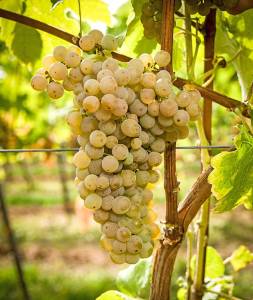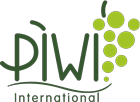Newly approved PIWI varieties in the wine regions of Europe
In the Official Journal of the EU C 222 of June 26, 2023, a new (PIWI) variety was approved for the PDO "Champagne". The Voltis variety has been added to the existing seven main varieties. The maximum permitted grape yield is 15.5 t/ha.
A notice on the creation of the new German PGI "Großräschener See" was published in the Official Journal of the EU C 222 on 26/06/2023. The cultivated varieties are the PIWI varieties Solaris, Cabernet blanc, Johanniter and Pinotin. The PGI is located in Brandenburg on the Großräschener See, near the border with Saxony. The maximum yield is set at 90 hl/ha.
In the Official Journal of the EU C 230 of June 30, 2023, the approval of new varieties (PIWI) for the PGI "Pays d'Hérault" (near Montpellier) was granted. A total of 17 new PIWI varieties were added and 18 old varieties that are no longer used were removed. The newly approved PIWI varieties are Artaban N, Bronner B, Cabernet blanc B, Cabernet Cortis N, Floreal B, Johanniter B, Monarch N, Muscaris B, Pinotin N, Prior N, Saphira B, Sauvignac B, Solaris B, Soreli B, Souvigner gris B, Vidoc N and Voltis B. (N=Noir, B= Blanc)
Jiří Sedlo, July 18, 2023
PIWI grape variety Calardis Musqué receives plant variety protection
 The white grape variety cultivated at the Julius Kühn Institute with pleasant exotic fruit aromas is resistant to several pathogens.
The white grape variety cultivated at the Julius Kühn Institute with pleasant exotic fruit aromas is resistant to several pathogens.
(Siebeldingen) Vine breeding takes time. This also and especially applies to the new grape variety Calardis Musqué. It was crossed in 1964 at the Geilweilerhof in Siebeldingen from Bacchus and Seyval Blanc. 59 years later, the development of vine breeding at the Julius Kühn Institute (JKI), the Federal Research Institute for Cultivated Plants, has now been awarded plant variety protection.
Calardis Musqué is one of the so-called PIWI (fungus-resistant grape varieties). In addition to moderate resistance to powdery mildew, downy mildew and botrytis, it also has a high resistance to black rot. These properties mean that significantly fewer pesticides have to be applied during cultivation - an important step towards more sustainable viticulture and also essential for organic cultivation.
copyright Julius Kühn Institute
Spotlight on PIWI varieties by Edy Geiger
Since 2021, when many winegrowers were only able to keep fungal diseases under control with great difficulty, interest in PIWI vines has risen sharply. Especially because of the prospect of financial aid for new plants. PIWI pioneer Edy Geiger presents what he sees as the most promising varieties.
Source: Swiss magazine Obst + Wein April 2023
PIWI Pedia by Arnold Becker
PIWI-Sorten von A bis Z, in 3 Teilen
Pilzwiderstandsfähige Rebsorten (Piwis) erfahren derzeit ein gesteigertes Interesse: Forschungen werden intensiviert, Vereinigungen zu diesem Thema gegründet und Pfropfreben mancher Sorten sind in Deutschland auf 3 Jahre hin ausverkauft. Gleichzeitig will die Zusammensetzung des Rebsortenportfolios innerhalb eines Betriebs gut über legt sein. Arno Becker vom DLR Rheinhessen-Nahe-Hunsrück möchte mit der Erstellung einer „Piwi-Pedia“ Hilfestellung geben.
Ziel dieses Beitrags ist es, vorhandenes Wissen zusammenzuführen, fortzuschreiben und einen möglichst umfassenden Überblick zu vermitteln. Schließlich werden immer wieder Erkenntnisse über Versuchsserien veröffentlicht, die zwar Teile des Themas darstellen, aber es naturgemäß nicht in der Gesamtheit abbilden können.
Zudem hat der Komplex pilzwiderstandsfähige Rebsorten eine hohe Dynamik, so dass es der Fachliteratur oft schwerfällt, Schritt zu halten.
Bei Züchterangaben werden zudem überwiegend die positiven Attribute in den Vordergrund gestellt.
Quelle: Das deutsche Weinmagazin 14.1.2023 1/2 bis 4
New Funugs-Resistant Grapevine Vitis and V. vinifera L. x M.
New Fungus Resistant Grapevine Vitis other V.vinifera L × M rotundifolia Derivative Hybrids Display a Drought-Independent Response in thiol precursor levels
Luciana Wilhelm de Almeida, Laurent Torregrosa, Gabriel Dournes, Anne Pellegrino, Hernan Ojeda, and Aurelie Roland*
The use of new disease-resistant grapevine varieties is a long-term but promising solution to reduce chemical inputs in viticulture. However, little is known about water deficit effects on these varieties, notably regarding berry composition. This study is aimed at characterizing the primary metabolites and thiol precursors levels of 6 fungi-resistant varieties and Syrah. Vines were grown under field conditions and under different water supply levels, and harvested at the phloem unloading arrest. A great variability among varieties regarding the levels of thiol precursors was observed, with the highest concentration, of 539 μg/kg, being observed in the 3176-N, a hybrid displaying red fruits. Water deficit negatively and equally impacted the accumulation of sugars, organic acids, and thiol precursors per berry and per plant, with minor effects on their concentration. The observed losses of metabolites per cultivation area suggest that water deficits can lead to significant economic losses for the produce.
Sweden is working to get PGI
Short supply chains and the cultivation of fungus-resistant grape varieties
Robert Finger, Lucca Zachmann, Chloe McCallum*
The grapevine is economically and culturally central to Swiss agriculture, but it is also the crop with the greatest use of pesticides. By using fungus-resistant grape varieties, the use of pesticides could be significantly reduced while maintaining the same quantity and quality of production. However, these varieties have only rarely been used to date. Using survey data from 775 Swiss vine producers (from now on 'producers'), we examine factors that influence the use of fungus-resistant varieties and analyze in particular the importance of marketing channels and the role of short supply chains. 20.1 % of respondents grow fungus-resistant varieties, but the acreage is only 1.2 %. Our results lead to a simple conclusion: the closer producers are to the end consumer, the more likely it is that fungus-resistant varieties will be used. For example, producers who mainly sell their wine through direct marketing are significantly more likely (8-38 %) to use fungus-resistant varieties.
Short supply chains and the adoption of fungus-resistant grapevine varieties
Robert Finger | Lucca Zachmann | Chloe McCallum
Agricultural Economics and PolicyGroup, ETH Zurich, Zurich, Switzerland
Correspondence:
Robert Finger, Agricultural Economicsand Policy Group, ETH Zürich,Sonnegggstrasse 33, Zürich 8092,Switzerland.Email:rofinger@ethz.ch
Funding information:
Swiss National Science Foundation,Grant/Award Number: 193762; FederalOffice for Agriculture
Editor in charge: Mindy Mallory
.Senior authorship is shared among allthree co-authors.
Abstract: Using fungus-resistant grapevine varieties can reducepesticide use substantially, while maintaining productionquantity and quality. Using survey data from 775 pro-ducers in Switzerland, we investigate the adoption offungus-resistant varieties and especially analyze the rele-vance of marketing channels and short supply chains.We find that 20.1% of respondents use fungus-resistantvarieties but the acreage is only 1.2%. Our results narrowdown to a simple conclusion: the less distant the pro-ducer is from the final consumer, the more likely theyuse fungus-resistant varieties. For example, producersselling their wine mainly via direct marketing have ahigher (8%–38%) uptake of fungus-resistant varieties.
Cooperation with wein.plus: Benefit as a member of PIWI-International!
There is a cooperation between PIWI International and wein.plus that aims to promote the association and its members on wein.plus. In this webinar, which lasts no more than 10 minutes, Utz Graafmann will show how you as a winery can benefit from this.
Tuesday, February 14, 2023 at 6 p.m. (the webinar will be recorded)
Sell wine successfully with wein.plus for wineries
Find out how you, as a winery, can maximize your wine sales, find stockists across Europe and get support in the sales process. Learn methods to increase the visibility of your winery on wein.plus and increase your sales figures. Use wein.plus to bring additional visitors to your winery or to advertise events.
Language: German
Duration: 20 minutes
PIWI in Venice – the first edition a great success
Great success for the first edition of I VINI PIWI A VENEZIA on 03-12-2022. The event was attended by 18 producers from all over Italy. Great participation of the public, winemakers and journalists. The need for national cohesion is presented and everyone's needs are taken into account. We are shaping the future now, together.
The next events in 2023 will take place in Milan and Cortina!
We thank Renato Vettorato for the beautiful photos, Gianpaolo Baly Ballielo and others who contributed their photos to this album.
In praise of piwis
- Chris Boiling 2022-12-13
German winemaker Jürgen Amthor has successfully harvested his Cabernet Cortis – 95% healthy after only two sprays a year. We look at this and the potential of other leading disease-resistant grape varieties…
Jürgen Amthor, the owner of the first probiotic PIWI vineyard in Franconia, Germany, is happy about his harvest of the fungal-resistant red grape variety Cabernet Cortis. The grapes are 95% healthy. They have a very ripe and fruity aroma with a sugar content of 85°Oe (20.5 Brix) and balanced acidity.
Hybrids: Finding a Place
In a world apparently tiring of experts, there is at least one in the viticultural sphere that we should be grateful for. In 2020, research led by Andrew Walker, a geneticist and professor of viticulture and enology at UC Davis, led to the release of five new grape varieties. They have some advantages in common. Sarah Philips McCartan reports.
Reading time: 5m 45s

